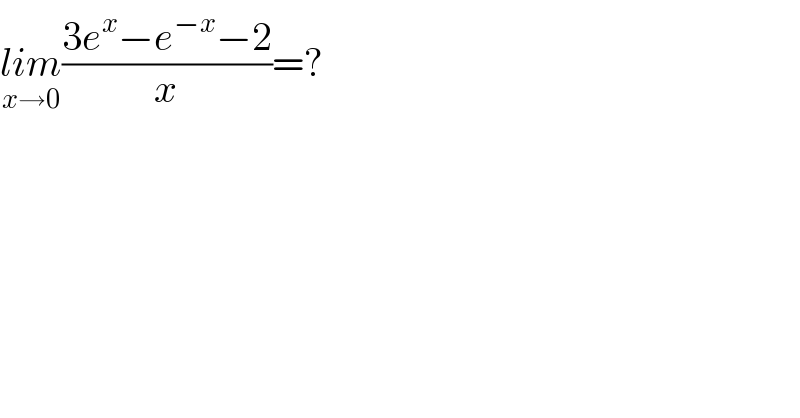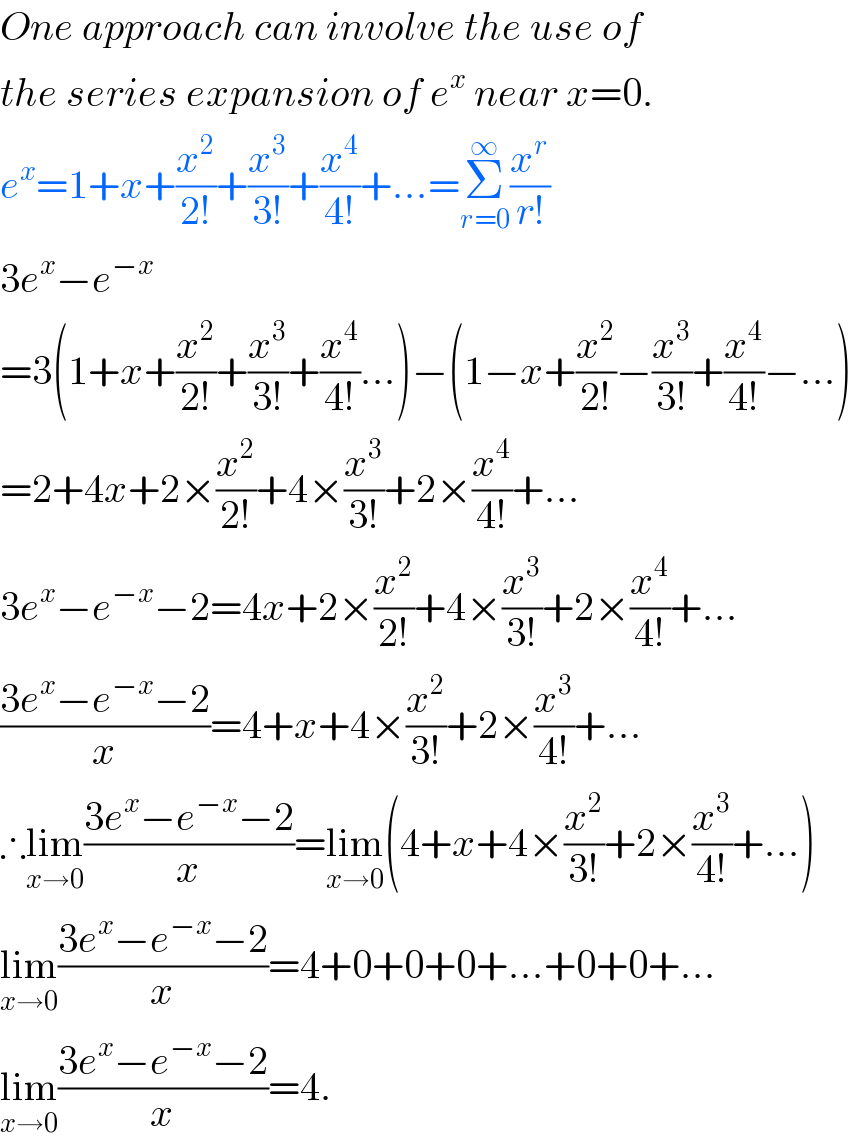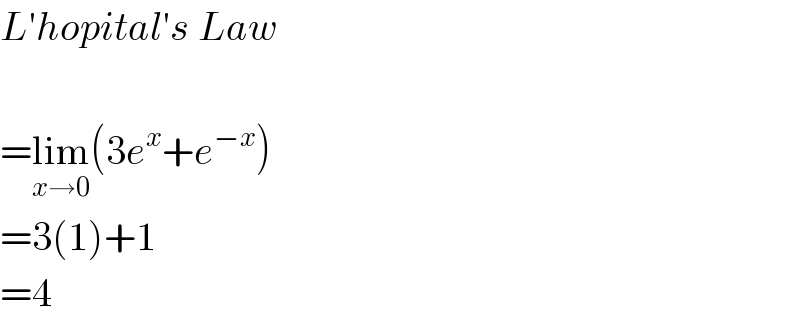Question Number 4448 by Rasheed Soomro last updated on 29/Jan/16

$$\underset{{x}\rightarrow\mathrm{0}} {{lim}}\frac{\mathrm{3}{e}^{{x}} −{e}^{−{x}} −\mathrm{2}}{{x}}=? \\ $$
Answered by Yozzii last updated on 29/Jan/16

$${One}\:{approach}\:{can}\:{involve}\:{the}\:{use}\:{of} \\ $$$${the}\:{series}\:{expansion}\:{of}\:{e}^{{x}} \:{near}\:{x}=\mathrm{0}. \\ $$$${e}^{{x}} =\mathrm{1}+{x}+\frac{{x}^{\mathrm{2}} }{\mathrm{2}!}+\frac{{x}^{\mathrm{3}} }{\mathrm{3}!}+\frac{{x}^{\mathrm{4}} }{\mathrm{4}!}+…=\underset{{r}=\mathrm{0}} {\overset{\infty} {\sum}}\frac{{x}^{{r}} }{{r}!} \\ $$$$\mathrm{3}{e}^{{x}} −{e}^{−{x}} \\ $$$$=\mathrm{3}\left(\mathrm{1}+{x}+\frac{{x}^{\mathrm{2}} }{\mathrm{2}!}+\frac{{x}^{\mathrm{3}} }{\mathrm{3}!}+\frac{{x}^{\mathrm{4}} }{\mathrm{4}!}…\right)−\left(\mathrm{1}−{x}+\frac{{x}^{\mathrm{2}} }{\mathrm{2}!}−\frac{{x}^{\mathrm{3}} }{\mathrm{3}!}+\frac{{x}^{\mathrm{4}} }{\mathrm{4}!}−…\right) \\ $$$$=\mathrm{2}+\mathrm{4}{x}+\mathrm{2}×\frac{{x}^{\mathrm{2}} }{\mathrm{2}!}+\mathrm{4}×\frac{{x}^{\mathrm{3}} }{\mathrm{3}!}+\mathrm{2}×\frac{{x}^{\mathrm{4}} }{\mathrm{4}!}+… \\ $$$$\mathrm{3}{e}^{{x}} −{e}^{−{x}} −\mathrm{2}=\mathrm{4}{x}+\mathrm{2}×\frac{{x}^{\mathrm{2}} }{\mathrm{2}!}+\mathrm{4}×\frac{{x}^{\mathrm{3}} }{\mathrm{3}!}+\mathrm{2}×\frac{{x}^{\mathrm{4}} }{\mathrm{4}!}+… \\ $$$$\frac{\mathrm{3}{e}^{{x}} −{e}^{−{x}} −\mathrm{2}}{{x}}=\mathrm{4}+{x}+\mathrm{4}×\frac{{x}^{\mathrm{2}} }{\mathrm{3}!}+\mathrm{2}×\frac{{x}^{\mathrm{3}} }{\mathrm{4}!}+… \\ $$$$\therefore\underset{{x}\rightarrow\mathrm{0}} {\mathrm{lim}}\frac{\mathrm{3}{e}^{{x}} −{e}^{−{x}} −\mathrm{2}}{{x}}=\underset{{x}\rightarrow\mathrm{0}} {\mathrm{lim}}\left(\mathrm{4}+{x}+\mathrm{4}×\frac{{x}^{\mathrm{2}} }{\mathrm{3}!}+\mathrm{2}×\frac{{x}^{\mathrm{3}} }{\mathrm{4}!}+…\right) \\ $$$$\underset{{x}\rightarrow\mathrm{0}} {\mathrm{lim}}\frac{\mathrm{3}{e}^{{x}} −{e}^{−{x}} −\mathrm{2}}{{x}}=\mathrm{4}+\mathrm{0}+\mathrm{0}+\mathrm{0}+…+\mathrm{0}+\mathrm{0}+… \\ $$$$\underset{{x}\rightarrow\mathrm{0}} {\mathrm{lim}}\frac{\mathrm{3}{e}^{{x}} −{e}^{−{x}} −\mathrm{2}}{{x}}=\mathrm{4}. \\ $$
Answered by FilupSmith last updated on 29/Jan/16

$${L}'{hopital}'{s}\:{Law} \\ $$$$ \\ $$$$=\underset{{x}\rightarrow\mathrm{0}} {\mathrm{lim}}\left(\mathrm{3}{e}^{{x}} +{e}^{−{x}} \right) \\ $$$$=\mathrm{3}\left(\mathrm{1}\right)+\mathrm{1} \\ $$$$=\mathrm{4} \\ $$
Answered by Rasheed Soomro last updated on 29/Jan/16
![Using lim_(x→0) ((e^x −1)/x)=1 lim_(x→0) ((3e^x −e^(−x) −2)/x) =lim_(x→0) ((3e^x −3−e^(−x) +1)/x) =lim_(x→0) ((3(e^x −1)−(e^(−x) −1))/x) =lim_(x→0) [((3(e^x −1))/x)+((e^(−x) −1)/(−x))] x→0 ⇒−x→0 =3lim_(x→0) ((e^x −1)/x)+lim_(−x→0) ((e^(−x) −1)/(−x)) =3(1)+1=4](https://www.tinkutara.com/question/Q4456.png)
$${Using}\:\underset{{x}\rightarrow\mathrm{0}} {{lim}}\frac{{e}^{{x}} −\mathrm{1}}{{x}}=\mathrm{1} \\ $$$$\underset{{x}\rightarrow\mathrm{0}} {{lim}}\frac{\mathrm{3}{e}^{{x}} −{e}^{−{x}} −\mathrm{2}}{{x}} \\ $$$$=\underset{{x}\rightarrow\mathrm{0}} {{lim}}\frac{\mathrm{3}{e}^{{x}} −\mathrm{3}−{e}^{−{x}} +\mathrm{1}}{{x}} \\ $$$$=\underset{{x}\rightarrow\mathrm{0}} {{lim}}\frac{\mathrm{3}\left({e}^{{x}} −\mathrm{1}\right)−\left({e}^{−{x}} −\mathrm{1}\right)}{{x}} \\ $$$$=\underset{{x}\rightarrow\mathrm{0}} {{lim}}\left[\frac{\mathrm{3}\left({e}^{{x}} −\mathrm{1}\right)}{{x}}+\frac{{e}^{−{x}} −\mathrm{1}}{−{x}}\right] \\ $$$${x}\rightarrow\mathrm{0}\:\Rightarrow−{x}\rightarrow\mathrm{0} \\ $$$$=\mathrm{3}\underset{{x}\rightarrow\mathrm{0}} {{lim}}\frac{{e}^{{x}} −\mathrm{1}}{{x}}+\underset{−{x}\rightarrow\mathrm{0}} {{lim}}\frac{{e}^{−{x}} −\mathrm{1}}{−{x}} \\ $$$$=\mathrm{3}\left(\mathrm{1}\right)+\mathrm{1}=\mathrm{4} \\ $$
